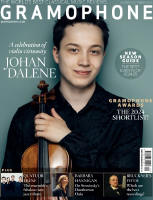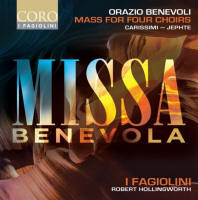Texte paru dans: / Appeared in: |
|
|
|
|
|
Mark Seow waxed ecstatic about the first volume of I Fagiolini’s Benevoli series (A/23), which continues with a Mass for four choirs that came to bear the composer’s name in some sources (presumably as a mark of contemporary approval). The keynote here again is sheer sonic splendour, captured by a detailed sound recording that’s almost overwhelming at times (but in the best sense), with a particularly powerful bass register. Equally, Benevoli’s handling of monumental resources is masterly: he moves seamlessly between neo-Palestrinian counterpoint to blockbuster polychoral effects with subtle tonal and chromatic shifts that evoke Gabrieli and Monteverdi, while the episodes for soloists bring you up to date with Benevoli’s direct contemporary Carissimi (on whom more shortly). After a nicely compact Kyrie and a more expansive Gloria, the Credo is a smorgasbord of panels – a real feast, building to a sumptuous conclusion.
Polychoral music is sometimes overreliant on the repetition of similar effects, but Benevoli deftly steers clear of the usual elephant traps. Robert Hollingworth’s gently humorous and informative notes specify that his approach to instrumental scoring is different from the previous album, not least because of the difficulty of distinguishing four choirs in stereo – a characteristically thoughtful and practical insight, which inspires confidence. And really, the blend of voices and instruments is superb. On its own, the Mass is a worthy successor to the first instalment.
The Mass is broken up with two very fine motets for soloists by Carissimi. I’m always impressed by his works in this style, ever since the Gabrieli Consort’s Christmas Mass in Rome c1620 some 30 years ago (Archiv, 1/94). Both are very characterfully delineated. (I’d have gladly had another, especially as the Benedictus of the Mass was usually replaced with one.)
A stranger decision is the inclusion (an extended bonus track, if you will) of Carissimi’s greatest hit, the oratorio Jephte. It’s a great piece and a fine performance, particularly the chorus, who sing with great gusto at first but dissolve in grief by the end. The soloists are very believable, though Julia Doyle forces her voice on her first intervention as Jephte’s daughter (admittedly she has a din of percussion to contend with). I could always do with more ornamentation in this repertory but did enjoy Frescobaldi’s uncredited cameo as a prologue to the oratorio. All the same, the oratorio sits oddly with the Mass; it would fit better on an all-Carissimi album, which, from I Fagiolini on this form, would be a treat indeed. |
|




